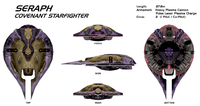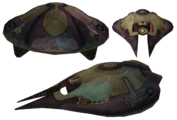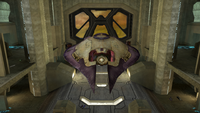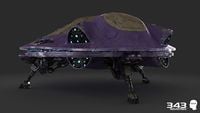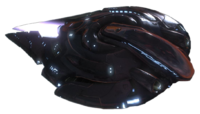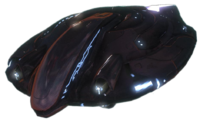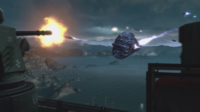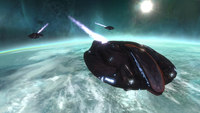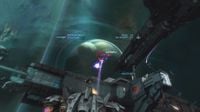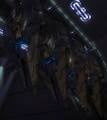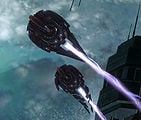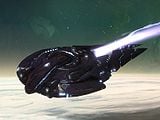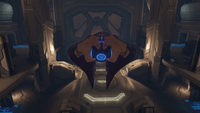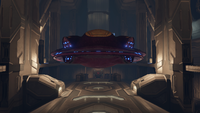Morsam-pattern Seraph
From Halopedia, the Halo wiki
| Type-31 Exoatmospheric Multirole Fighter | |
|---|---|
File:H3-Seraph overhead1 SLoftus.jpg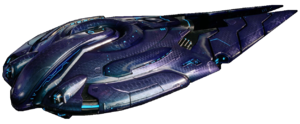
| |
| Production information | |
|
Manufacturer: |
Assembly Forges[1] Tertiary Assembly Forges[2] (Replacements in fleets.) |
|
Class: |
Type-31 |
|
Role: |
Combat space fighter |
| Technical specifications | |
|
Length: |
31 metres (100 ft) (Morsam),[1] 23.85 metres (78.2 ft) (Kai)[2] |
|
Width: |
15.1 metres (50 ft) (Morsam),[1] 15.93 metres (52.3 ft) (Kai)[2] |
|
Height: |
5.6 metres (18 ft) (Morsam),[3] |
|
Mass: |
50 metric tons (Kai)[2] |
|
Engine(s): |
|
|
Slipspace drive: |
Equipped |
|
Hull: |
|
|
Armament: |
Kai Pattern:
Morsam Pattern: |
|
Crew: |
|
| Chronological and affiliation | |
|
Era: |
|
|
Affiliation: |
Covenant |
The Type-31 Exoatmospheric Multirole Fighter,[5] more commonly known as the Seraph, was the Covenant's primary space fighter.[6] Formerly manufactured and produced by Assembly Forges, the Seraph is the successor to the older Tarasque-class heavy fighter. It is a more powerful, though less common counterpart to the unshielded and expendable Type-27 Banshee.[7]
Specifications
Design details
The Seraph features a piscine, teardrop-like shape, fitting with the overall design elegance the Covenant is known for. Seraph fighters are mostly stored in the hangar bays of Covenant ships or stations when they are not in battle or escorting a ship. Morsam-pattern Seraphs have two movable flaps on either side of their hull, and their twin "tails" are articulated to aid with directing exhaust, while Kai-pattern Seraphs have fixed "tails". These features give the Seraph superior turning capabilities in zero-gravity environments. Despite their efficiency and speed in space, Seraph fighters are graceless and sluggish in atmospheric conditions due to their odd teardrop-like shape. Seraphs fill a variety of roles in a Covenant fleet, such as a strike fighter or for ship-to-ship combat in dogfights.[8] Seraphs can also be used for the occasional bombing run,[4] but it is considered a rare sight by UNSC forces.[9] Seraphs have the ability to power down and slip past hostile sentries and human sensors.[10] Unlike the Type-26 Banshee or Type-52 Phantom, nearly all Seraphs are equipped with multiphase energy shielding,[9] although this does not seem to always be the case.[11] However, these energy shields are only a fraction of the strength of those on capital ships and are easily depleted with sustained fire.[12] They also reinforce the craft's inertial compensators, allowing the craft to take hits that would rip other craft apart.[2] Seraph hull plating self-repairs when damaged, adjusting to compensate for lost aerodynamic features during combat.[2]
As the Covenant's main space-based attack fighter, the Seraph is highly maneuverable while in space, and can easily keep pace with the UNSC's GA-TL1 Longsword.[4] Though not specifically intended for atmospheric use, Seraphs still are significantly faster than Banshees while flying at low altitudes. They have even been shown to fly in the hurricane force winds of the gas giant Threshold.[13] Seraphs are controlled via a direct neural interface with their flight harness, using minimal safety cutouts and filters. While the pilot's body is rendered immobile to reduce the risk of injury, they control the ship with their thought, much the same way as a UNSC pilot's neural interface.[2] Unlike UNSC systems, however, this method induces significant pain called interface burn in the pilot. Elites enter a meditative state before they complete an uplink to control the pain, while Brute pilots embrace the pain to trigger their own focus.[2]
Armaments
Seraphs have demonstrated that they are a very effective counter-weapon against Longsword interceptors unless the latter attacks from the side or behind. Seraphs usually attack in formations of ten, their assaults on enemy ships range from simple harassment to full out strafing attacks. They have also been seen patrolling in pairs. It is assumed that Seraph fighters can be piloted by a single Sangheili or Jiralhanae.[4]
The Seraph is armed with a variety of weapons. Seraphs are seen firing a heavy plasma cannon, and are also armed with a pulse laser and plasma charges for strafing and bombing runs.[4] A Seraph's bombing runs are very deadly, as evidenced in Operation: TORPEDO, the SPARTAN-III Beta Company's attack on a Covenant refinery on Pegasi Delta.[9] The Seraph's energy weapons deliver a hard punch to anything it attacks, such as D77-TC Pelican dropships,[14] and when dueling with the UNSC space-superiority YSS-1000 Sabres.[15] A Seraph was also capable of doing some damage against a Halcyon-class light cruiser's Titanium-A armor plating.[10]
Operational history
Seraphs have seen operational use as early as the Harvest campaign. They are a common adversary of the Longsword fighters. These starfighters provided excellent fire support to all Covenant forces in space and on the groundside. Elite pilots considered piloting a Seraph merely a means to attain enough glory to be reassigned to a ground combat position, valuing their fighters only as tools to accomplish this. Despite their extensive training, their honor code gave them a tendency to peel off from their squadrons to engage in one-on-one dogfights, making them vulnerable in combat. Brute pilots were excluded from such training, but their pack mentality and rigid social hierarchy made them far more effective teams, and human pilots soon learned to fear Brute-piloted Seraphs, identifiable by clan markings and Forerunner symbols carved on their hulls, more than Elite-piloted Seraphs.[2]
Seraphs were prominently used during Operation: WARM BLANKET,[11] the Fall of Reach,[12] the Battle of Earth,[16] the Onyx Conflict, and the Battle of Installation 00. In Operation: TORPEDO, the Seraphs harassed the incoming SPARTAN-IIIs by bombarding them during the UNSC surprise assault of the Covenant refinery facilities. Several fighters were shot down by missiles fired from the M19-B surface-to-air missile launchers used by the SPARTAN-IIIs.[9]
During the Fall of Reach, the Seraphs attempted to disable the UNSC ships and orbital stations over the planet Reach, while providing some cover for the Covenant boarding crews. These attempts were subsequently prevented by UNSC Sabre-class interceptors, frigates, and Longsword interceptors.[15] Similar tactics were also employed during the Battle of Earth.
During the Battle of the Threshold gas mine, Sesa 'Refumee tried to escape on a Seraph but was killed by Arbiter Thel 'Vadam before he could.[13]
During the Battle of Installation 00, the Prophet of Truth's fleet deployed numerous Seraphs against the UNSC/Sangheili fleet in an effort to stop them from landing ground forces on the Ark. The Seraphs shot down a few Pelicans, but could not stop the others from breaking through.[17] The Seraphs were presumably destroyed along with the rest of the Covenant fleet.
On February 7, 2558, when the UNSC Infinity returned to the shield world Requiem to engage the local Promethean forces, numerous Seraphs belonging to Jul 'Mdama's Covenant were deployed around Requiem to prevent the humans from gaining entrance. These Seraphs attacked Infinity and the Pelicans it deployed to the surface, but were repelled by a squadron of F-41 Broadsword strike fighters.[18]
Several Seraphs from Jul 'Mdama's Covenant attacked Infinity during the Battle of Aktis IV.[19] Several wings saw action on both sides during the Battle of Sunaion.[20]
Trivia

|
Browse more images in this article's gallery page. |
- The Seraph is actually an old model of a Covenant tank that Shi Kai Wang created.[21]
- Instead of having a name that represents a sinister supernatural being like the Wraith or Phantom, the word "Seraph" is derived from the highest level of angels as described in certain texts of the Bible. However, Biblical seraphim have six wings while the Type-31 XMF has none.
- Halo 2 and Halo 3 use identical Seraph models. Similarly, Halo 4 seems to reuse the model from Halo: Reach, though with improved textures. The former model is smaller than the latter, the dimensions of which have been established in canon.[1] The original model's dimensions are L: 23.85m (78.26ft), W: 15.93m (52.27ft), H: 5.35m (17.56ft).[22]
- In the Halo: Reach post-game stats, the Seraph icon is erroneously represented by the image of a Sabre. On Halo Waypoint, the image is that of a regular Type-26 Banshee. On Bungie.net, the correct image of a Seraph is shown.
- In the same level, there is a glitch that makes it possible to hit a Seraph with an EMP shot from a plasma pistol and hijack it.[23]
- In the Halo Legends episode The Package, when Kelly-087 yells "Seraph formation!", the subtitles mistakenly say, "Syrup formation!"
Halo: Fleet Battles
Covenant Seraph Interceptor Flight
- Flight slots: 1
- Movement: 16"
- Damage track: 2
- Systems loadout: None
- Weapons: vs. wing targets
- Range: Contact
- Dice: 2
Gallery
- ReachConcept - Seraph.jpg
Concept art of the Seraph for Halo: Reach.
A Seraph docked inside the Threshold gas mine.
A Seraph shot down by UNSC anti-air turret nearby the Sabre Program Launch/Research Range.
A Seraph in orbit above Reach.
Separatist Seraph fighters engaging loyalist Seraph fighters over Installation 00.
List of appearances
Sources
- ^ a b c d Halo: The Essential Visual Guide, page 169
- ^ a b c d e f g h i j k l m n o p q Halo: Warfleet, p. 58-59
- ^ Halo: Reach, 3D model data
- ^ a b c d e f g h Halo Encyclopedia, page 283 (2011)
- ^ Halo Waypoint: The Universe - Tech
- ^ Halo: Reach: Game Stats
- ^ Halo: Reach, game manual
- ^ Halo Waypoint: Banshee Fighter
- ^ a b c d Halo: Ghosts of Onyx, pages 17-22
- ^ a b Halo: The Flood, page 12 (2010 edition)
- ^ a b Halo Legends, The Package
- ^ a b Halo: The Fall of Reach, page 330 (2010 edition)
- ^ a b Halo 2, campaign level The Oracle
- ^ Halo: First Strike, pages 8-9 (2003 edition); pages 18-19 (2010 edition)
- ^ a b Halo: Reach, campaign level Long Night of Solace
- ^ Halo 2, campaign level Cairo Station
- ^ Halo 3, campaign level The Ark
- ^ Spartan Ops, Departure
- ^ Halo: Escalation, Issue #15
- ^ Halo 5: Guardians, campaign level Battle of Sunaion
- ^ Halo 3, Collector's Edition Behind-the-Scenes
- ^ Idem, in-game model data
- ^ Bungie.net: How To Fly the Seraph - Tutorial
